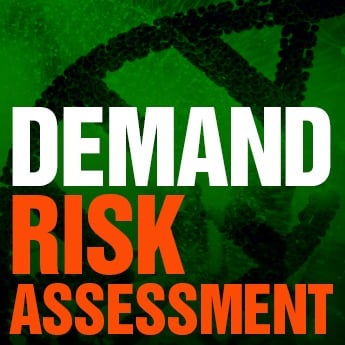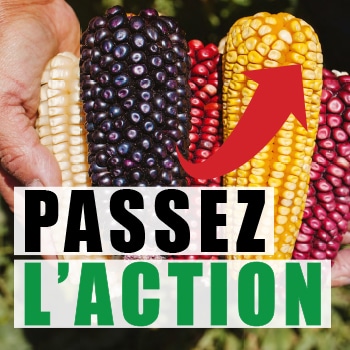Environmental groups call for a ban on releasing GMOs into the wild
Halifax, Ottawa, Sutton, November 8, 2023. Today, the Council of Canadian Academies (CCA) released an Expert Panel report commissioned by the Pesticide Management Regulatory Agency of Health Canada on the regulation of genetically engineering (genetically modified or GM) insects for pest control. The report focuses on the question of releasing gene-edited insects and “gene drive” organisms in particular, designed for release into the environment with the purpose of replacing or changing whole insect populations in the wild. The Expert Panel concludes that the complexity and uncertainties of using such genetically engineered insects (genetically modified organisms or GMOs) raise profound questions and require serious attention from the federal government.
“Releasing genetically engineered insects into the wild is a dangerous proposal for ecosystem engineering. This would be a massive open-air experiment that we cannot control. Gene editing makes new types of dangerous genetic engineering possible, with more types of organisms,” said Lucy Sharratt, Coordinator of the Canadian Biotechnology Action Network (CBAN), “We welcome the panel’s independent analysis which asks many profound questions and raises many of our concerns. We ask the government to respond with seriousness to the recommendations.”
The CCA Expert Panel on Regulating Gene-Edited Organisms for Pest Control report is called Framing Challenges and Opportunities for Canada. The report focuses on the use of the new genetic engineering techniques of gene editing that can be used to alter the genomes of insects for the purpose of eliminating insect populations in the wild or modifying their characteristics. The gene editing tool of CRISPR/Cas allows scientists to genetically engineer a pest to be a “gene drive” which can pass traits through an entire wild population, far beyond what nature allows via Mendelian inheritance.
The Expert Panel finds that, “the novelty of genetic pest-control tools, combined with uncertainty about their implementation and the diversity of target organisms, creates a variety of potential risks.”(1) The report states that, “A key ethical challenge in the use of genetic pest control is to determine when and whether these technologies should be used. Ethical issues also arise concerning how the technology is developed. How should humans intervene in nature?”(2)
CBAN, Vigilance OGM, Friends of the Earth Canada and Nature Canada are calling on the federal government to respond seriously to the Panel’s recommendations by recognizing the uncertainty and complexity that accompany proposals to release GMOs into the environment, including the need to engage the public and the expertise held in civil society. The groups are asking the government to ensure that no genetically engineered organisms are approved for release into the wild, for pest control or other purposes. The groups are also calling on the government to join 173 nations by ratifying the United Nations Cartagena Biosafety Protocol of the Convention on Biological Diversity which regulates the transboundary movement of living modified organisms.
“Canadian regulation is not set up to look at the big picture but focuses on each product one by one, asking only narrow questions. Our government is completely unprepared to assess the risks of releasing genetically engineered insects, trees, and microorganisms into the environment,” said Beatrice Olivastri, CEO of Friends of the Earth Canada.
The report follows Health Canada and the Canadian Food Inspection Agency’s recent decisions to allow companies to release some of their gene-edited plants and foods without any government safety assessments,(3) and just months after a media report revealed close collaboration between regulatory departments and the biotechnology and pesticide industry lobby group CropLife Canada in designing this corporate self-regulation.(4)
“The panel’s analysis confirms that the government was wrong to abandon their risk assessments of new gene-edited plants. We immediately need an inquiry into how departments have just surrendered their regulatory authority over many gene-edited plants and foods,” said Thibault Rehn of Vigilance OGM, “The government needs to act on the concerns and uncertainties of gene editing.”
The Panel report acknowledges that the processes of gene editing can result in unintended effects and uncertainties: “It also remains unclear whether off-target effects or other long-term consequences resulting from gene editing will significantly affect the safety and efficacy of these products.”(5)
“There are already many sustainable and safe pest control products and solutions available,” said Sharratt, “Organic and other ecological farmers in Canada are innovating pest control practices for the future and the government has an opportunity to prioritize support for organic farming in the new Sustainable Agriculture Strategy.”
In 2001, The Royal Society of Canada released an Expert Panel report on the future of food biotechnology at the request of Health Canada, the Canadian Food Inspection Agency, and Environment Canada. While the government implemented very few of that panel’s recommendations for regulatory reform, environmental groups hope the federal government will pay close attention to this new report’s findings.
“I’m glad to see this Panel strongly recommending increased public engagement on genetic engineering, including with Indigenous Peoples, in contrast to just teaming up with the biotech industry and largely ignoring public concerns and wider expertise,” says Mark Butler, Senior Coordinator of Nature Canada.
NOTES:
- Framing Challenges and Opportunities for Canada, The Expert Panel on Regulating Gene-Edited Organisms for Pest Control (2023), Main Findings.
- Framing Challenges and Opportunities for Canada, The Expert Panel on Regulating Gene-Edited Organisms for Pest Control (2023), Page xiv.
- For details see the Canadian Biotechnology Action Network cban.ca/NoExemptions
- Thomas Gerbet, Radio Canada, « Tiger Team » : quand fonctionnaires et lobbyistes coopèrent dans l’ombre / “Tiger team”: when civil servants and lobbyists cooperate in the shadows (unofficial translation), September 26, 2023.
- Framing Challenges and Opportunities for Canada, The Expert Panel on Regulating Gene-Edited Organisms for Pest Control (2023), Page xv.
For more information:
Lucy Sharratt, Coordinator Canadian Biotechnology Action Network (CBAN), 902 209 4906, coordinator@cban.ca;
Beatrice Olivastri, Friends of the Earth Canada, 613 724-8690, beatrice@foecanada.org;
Thibault Rehn, Coordinator, Vigilance OGM, 514-582-1674, contact@vigilanceogm.org;
Mark Butler, Senior Advisor, Nature Canada, 902 266 5401, mbutler@naturecanada.ca.
The Canadian Biotechnology Action Network (CBAN) brings together 15 groups to research, monitor and raise awareness about issues relating to genetic engineering in food and farming. CBAN members include farmer associations, environmental and social justice organizations, and regional coalitions of grassroots groups. CBAN is a project of MakeWay’s shared platform.
Friends of the Earth Canada is the Canadian member of Friends of the Earth International, the world’s largest grassroots environmental network campaigning on today’s most urgent environmental and social issues.
Vigilance OGM is a Quebec non-profit organization made up of groups and individuals from diverse backgrounds – farmers, environmentalists, consumers, citizens – all concerned about what we put on our plates every day and by the impact of modes agricultural production on the environment and human health.
Nature Canada is one of the oldest national nature conservation charities in Canada. For 80 years, Nature Canada has helped protect over 110 million acres of parks and wildlife areas in Canada and countless species. Today, Nature Canada represents a network of over 130,000 members and supporters and more than 1,000 nature organizations.






